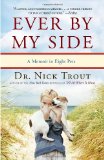Summary | Excerpt | Reading Guide | Reviews | Beyond the Book | Readalikes | Genres & Themes | Author Bio

A Memoir in Eight Acts Pets
Here was my first lesson in basic gastrointestinal physiology, that
according to my father, what goes in, must come out. Of course I
was potty-trained and more than capable of taking myself off to our
bathroom alone, but this was the first time I recall a clarification
of the cause-and-effect relationship between ingestion and elimination.
What I really needed to know was whether, during inappropriate
dining, Cleo had ever swallowed a spoon. If her current
discomfort was anything to go by, surely I would have noticed when
a firm metallic object found its way out?
My father must have misread the confusion and anxiety playing
across my face and tried to placate me by adding the word "Eventually."
It didn't work.
We waited for what felt like three hours but was probably more
like three minutes and watched as Cleo spun around and around,
scooting her rear along the grass in vain, clearly becoming more
and more frustrated.
"I've got an idea," my father said, standing up and heading back toward Cleo. "Go grab her ball."
I did as I was told and reported for duty.
"Now, when I'm ready, I want you to throw Cleo's ball as far away as possible."
I didn't understand.
"Why?"
"You'll see," he said.
Another adult response all inquisitive children despise because
obviously I didn't see and that was why I was asking the question in the first place.
"But I can't throw very far."
My father insisted that this wouldn't matter (alternatively, he may have said, "Just shut up and do as you're told") and stood a short distance behind Cleo after placing me and the ball in my hand at her head.
"Hold on a moment, son," he said, watching and waiting as Cleo forgot about her troubles, focused on the ball, and tried to anticipate which way it would go.
At the time I never noticed how my father was placing the sole
of his shoe firmly down to the ground, pinning the trailing end of
the wayward hosiery in place.
"Now," he shouted, and with concentration and enough fierce determination to produce a little grunt as I bit down on the tip of my tongue, I released the airy plastic ball from my hand like a shot put, and it landed about three feet away.
Not far but far enough for Cleo to pounce forward, retrieve the
ball, and leave the stocking behind, lying on the ground.
Cleo acted as if nothing had happened and plunged right back
into our game, dropping the ball at my feet, ready to go again. Just
once, she glanced over her shoulder at my father and the stringy,
discolored length of nylon before focusing on me, as if she seemed
disturbed by what he was doing, as if she would rather he pick up
what ever it was that had become stuck to his foot because it was
disgusting.
Although I like to chalk this up as my first, if indirect, canine
medical intervention, I should point out that this approach to treating
Cleo's protruding foreign body may have seemed rational but
was totally inappropriate. My father should have left well alone and
sought veterinary advice. What if the stocking had been lodged in
Cleo's small intestines? What if the nylon had cheese-wired through her guts? Fortunately, as it turned out she was lucky, perfectly fine, ready to graze her way through my grandmother's lingerie once again. It would be decades before I saw the error in our approach to her predicament.
All three of us walked away from the incident as though nothing
much had happened. At no time did my father and I dwell on
what we had done, on how our ploy had brought about Cleo's
transition from anxious and uncomfortable to oblivious and happy
to play. He never paused to ruminate on the moment when the seed
of possibility was firmly planted, to recognize the first inkling of his
son's interest in helping sick animals. Within seconds Cleo and I had returned to the carefree rhythm of fetch and my fickle attention had moved on, my pitching arm quick to tire, boredom setting
in, and a more pressing question racing to the forefront of my mind.
Excerpted from Ever By My Side by Dr. Nick Trout. Copyright © 2011 by Dr. Nick Trout. Excerpted by permission of Broadway Books. All rights reserved. No part of this excerpt may be reproduced or reprinted without permission in writing from the publisher.
Your guide toexceptional books
BookBrowse seeks out and recommends the best in contemporary fiction and nonfiction—books that not only engage and entertain but also deepen our understanding of ourselves and the world around us.